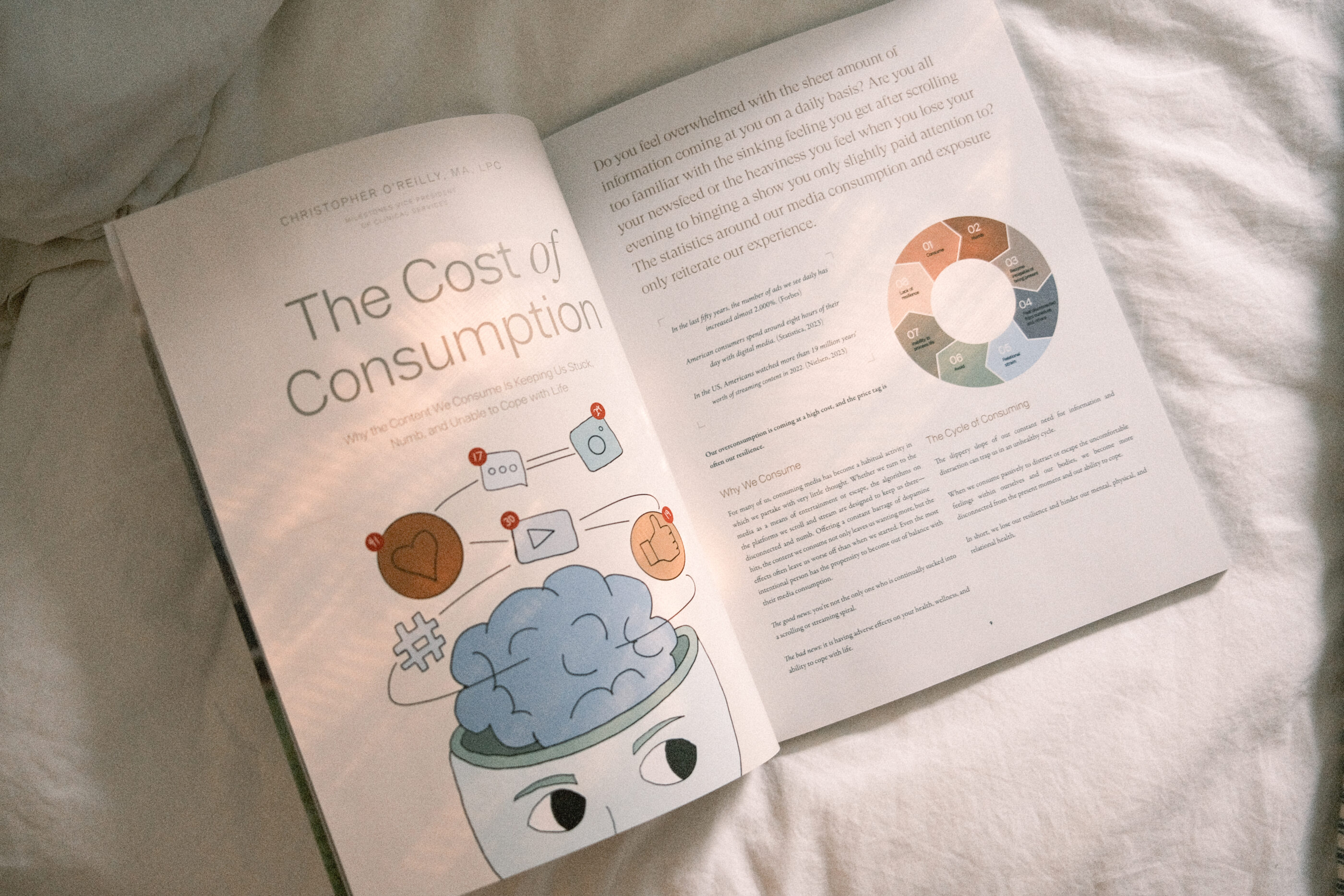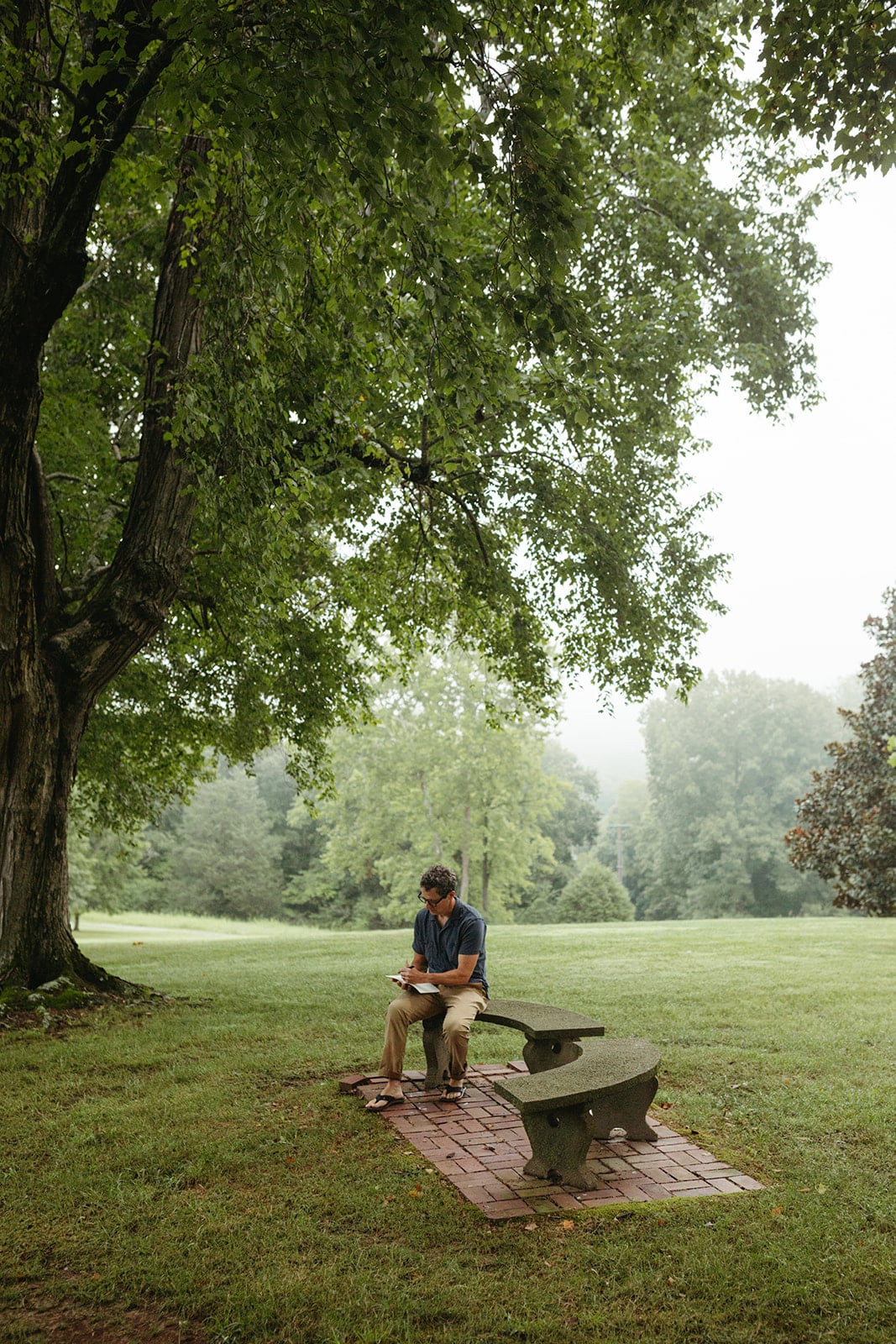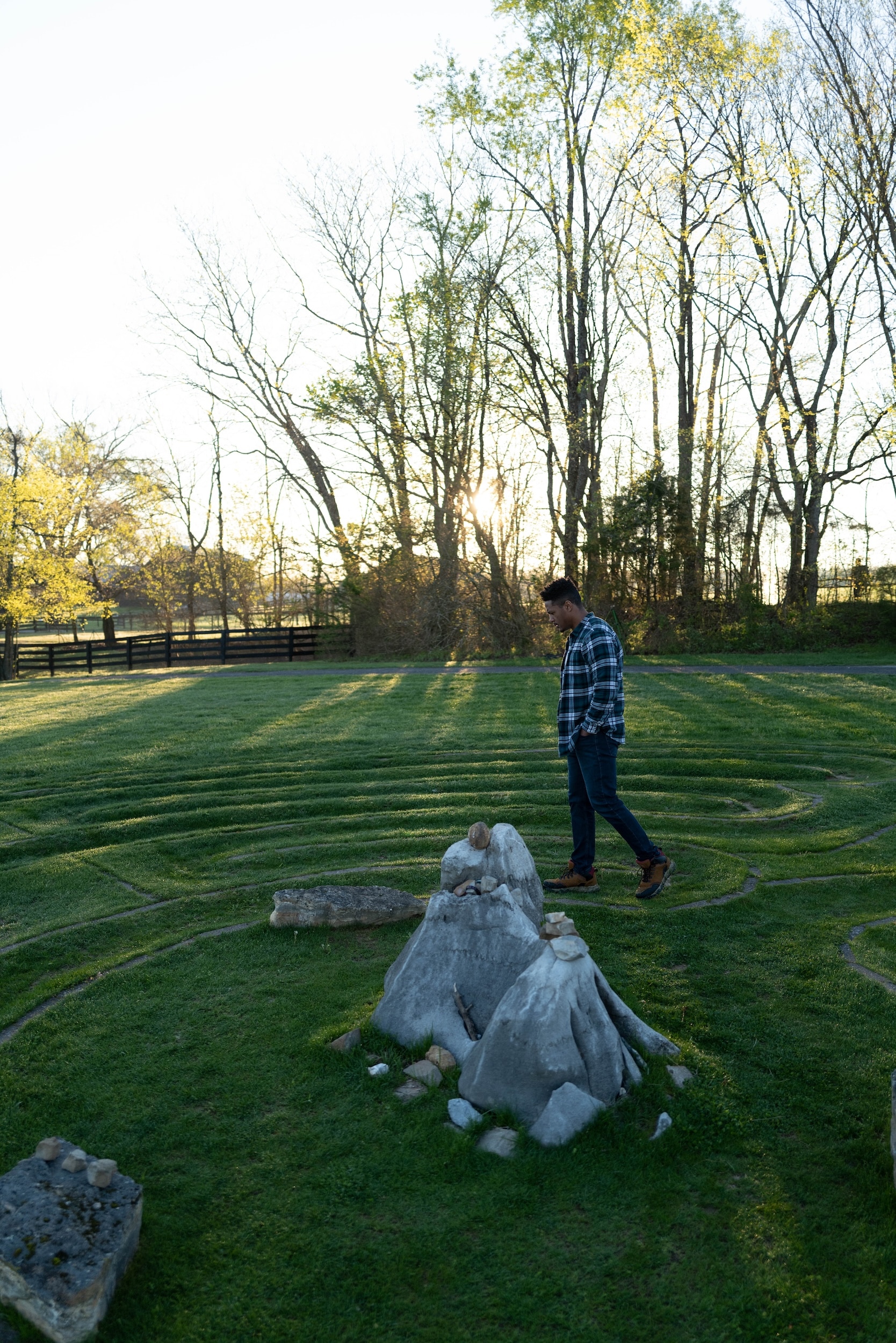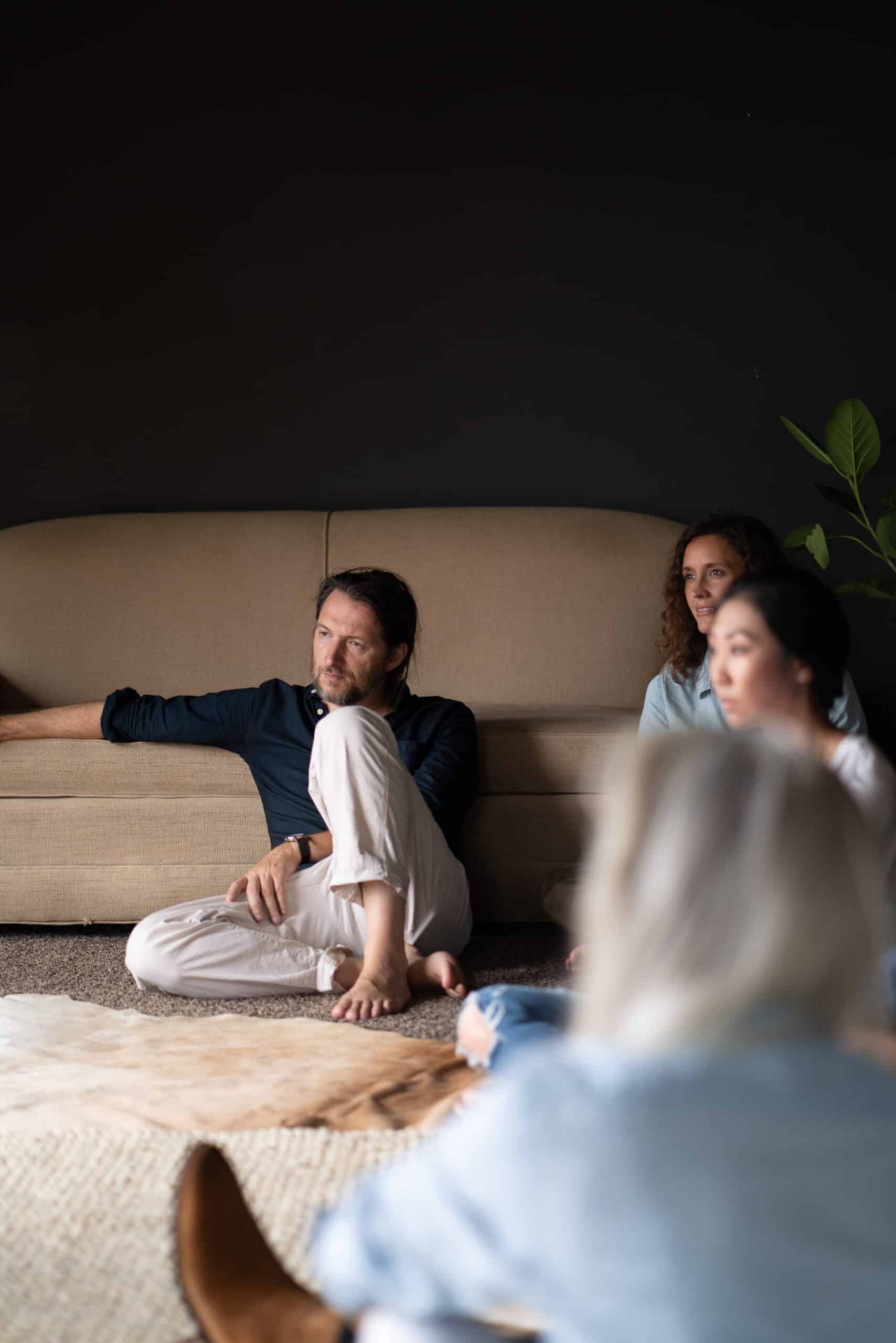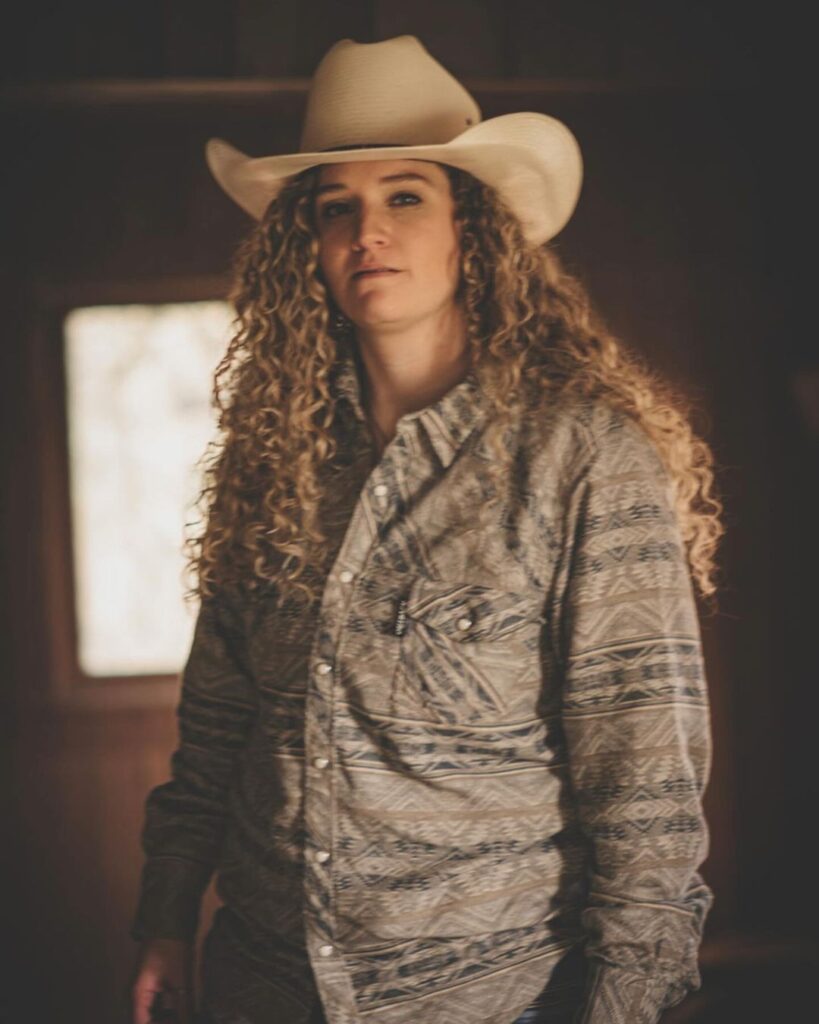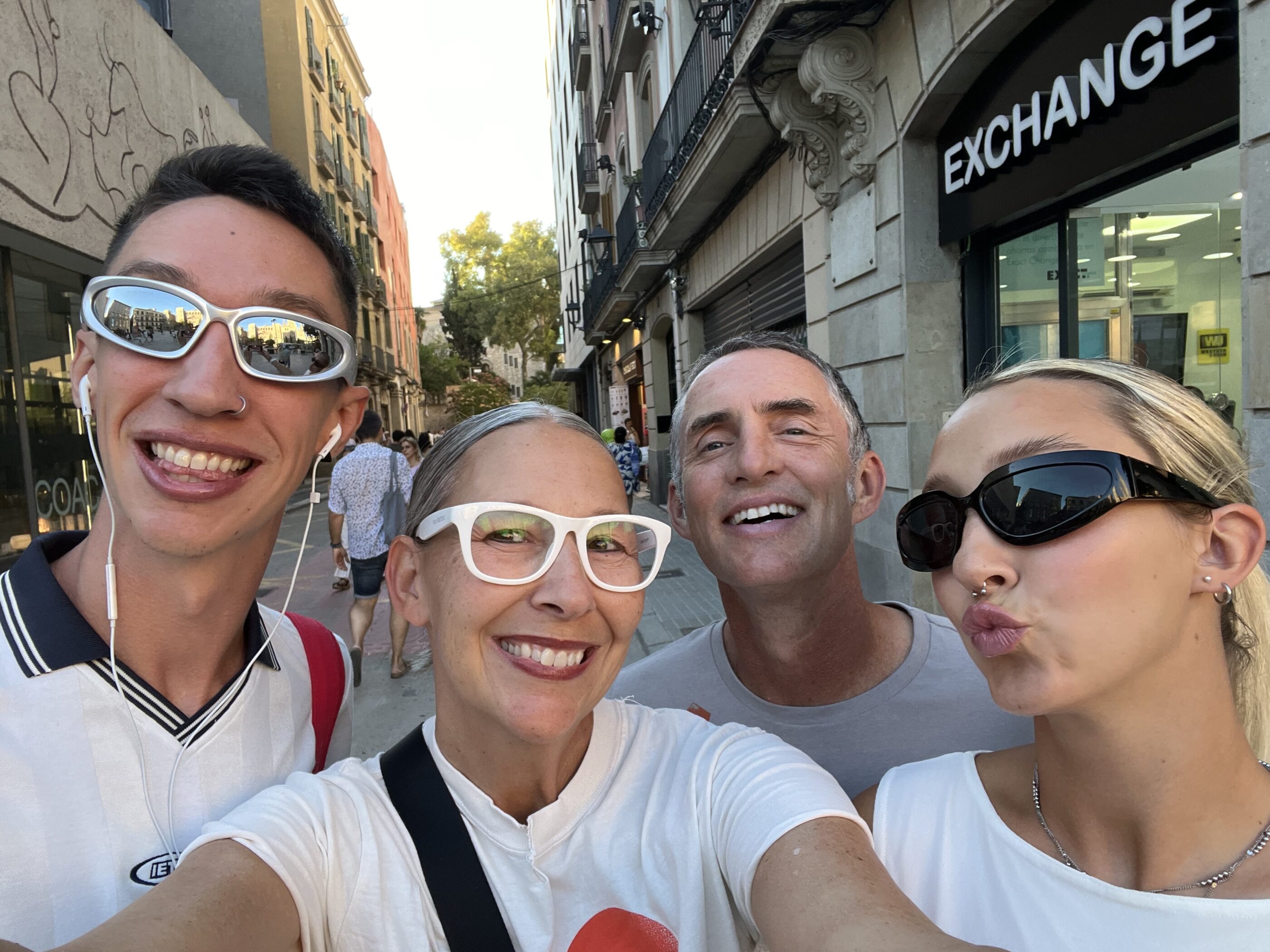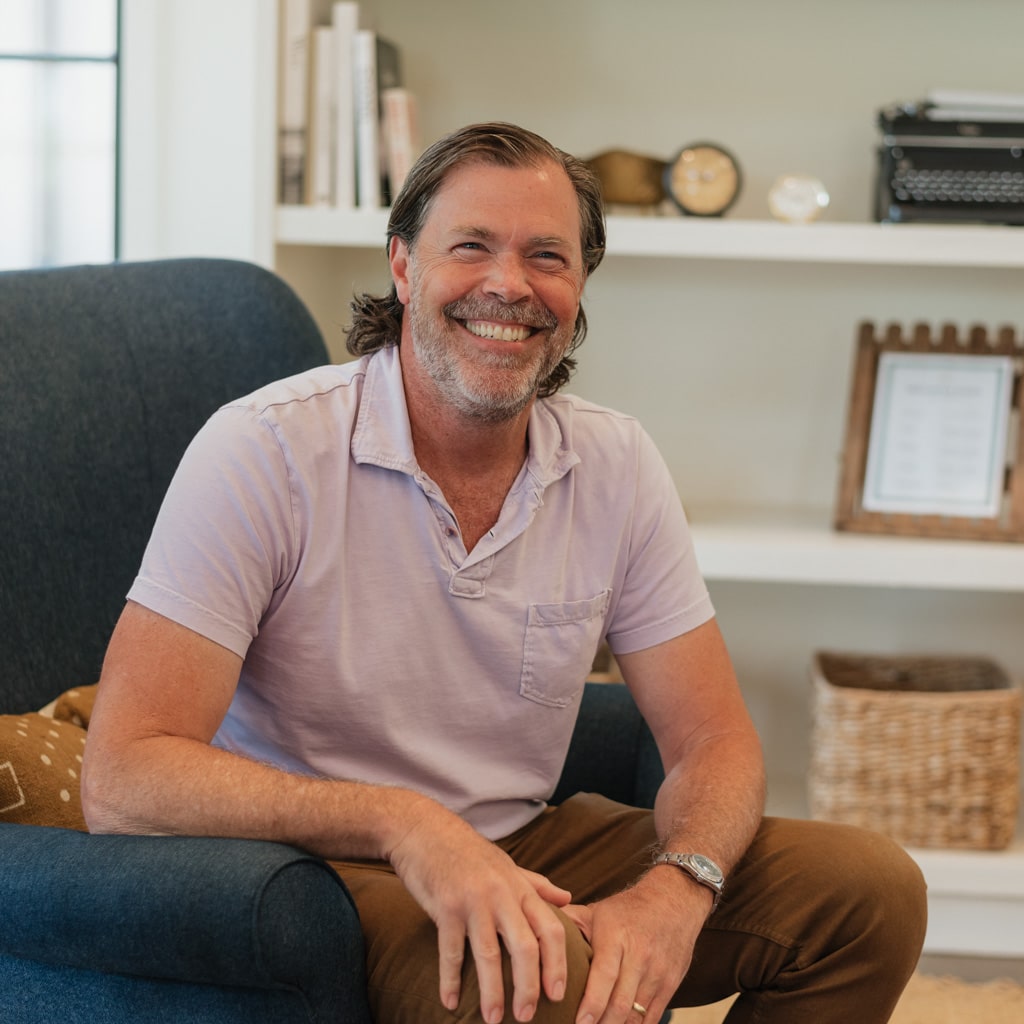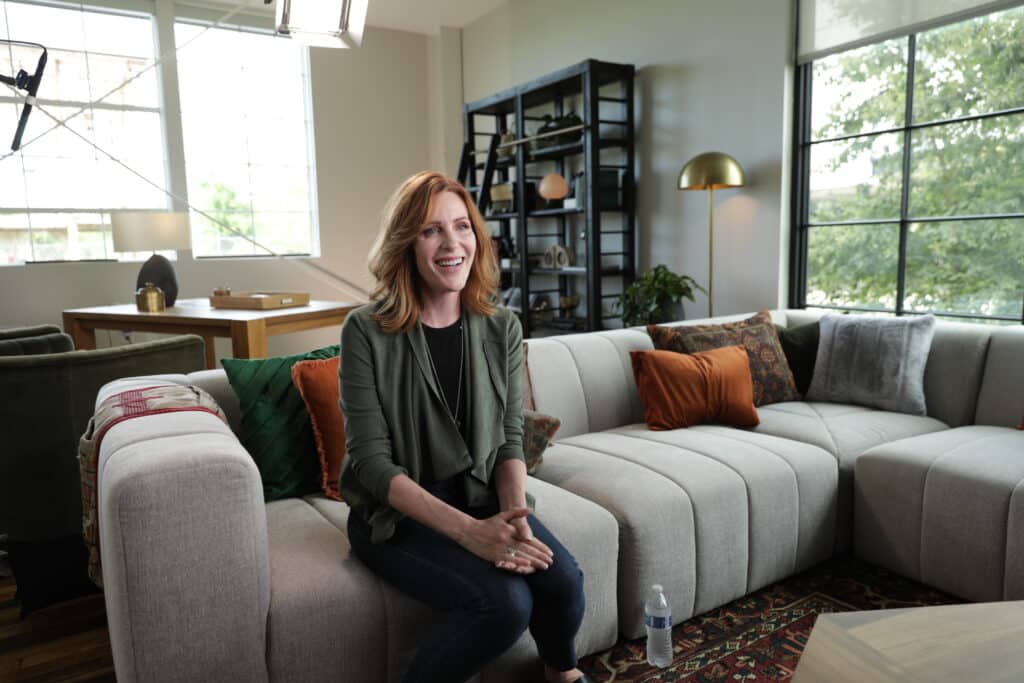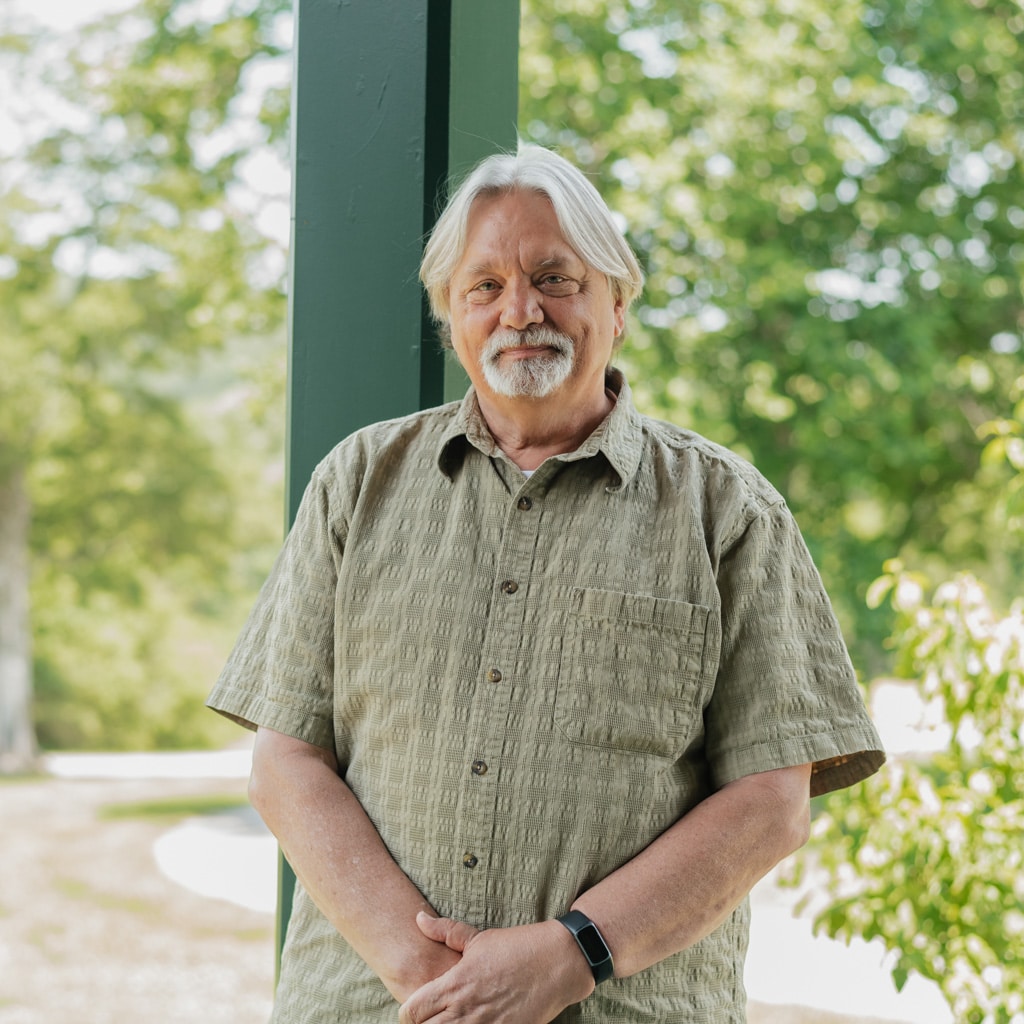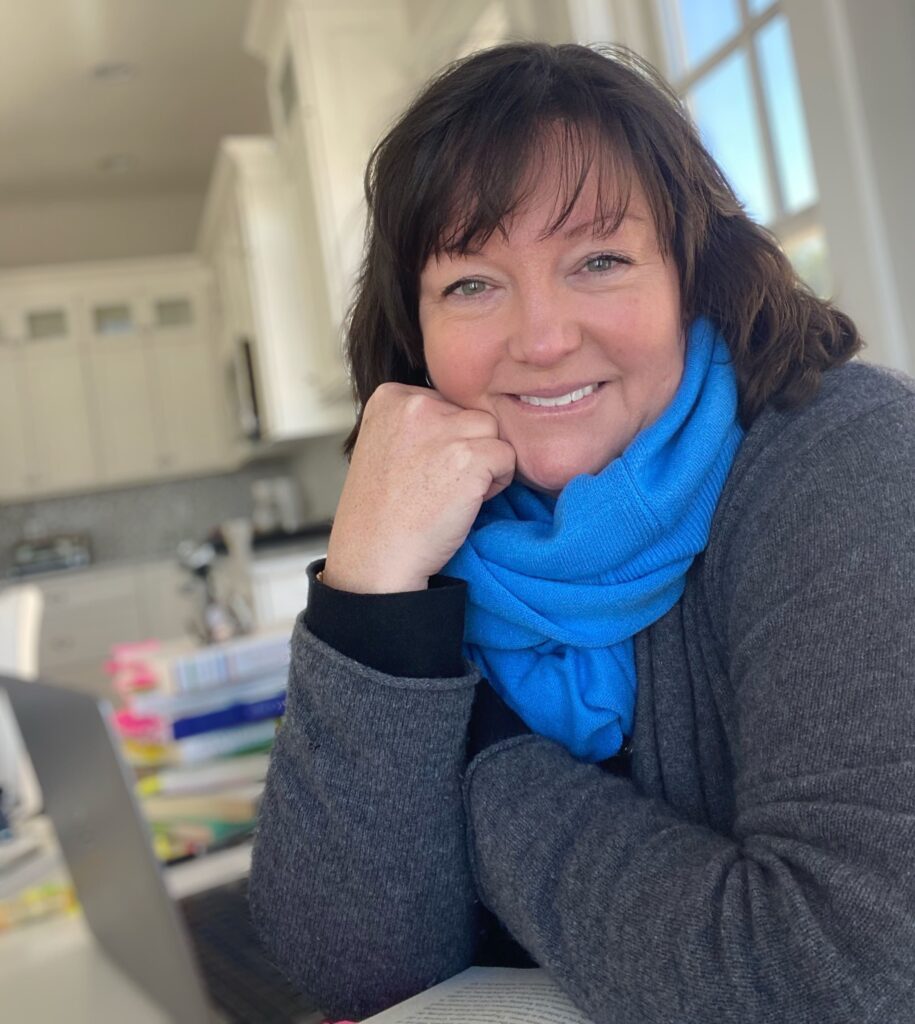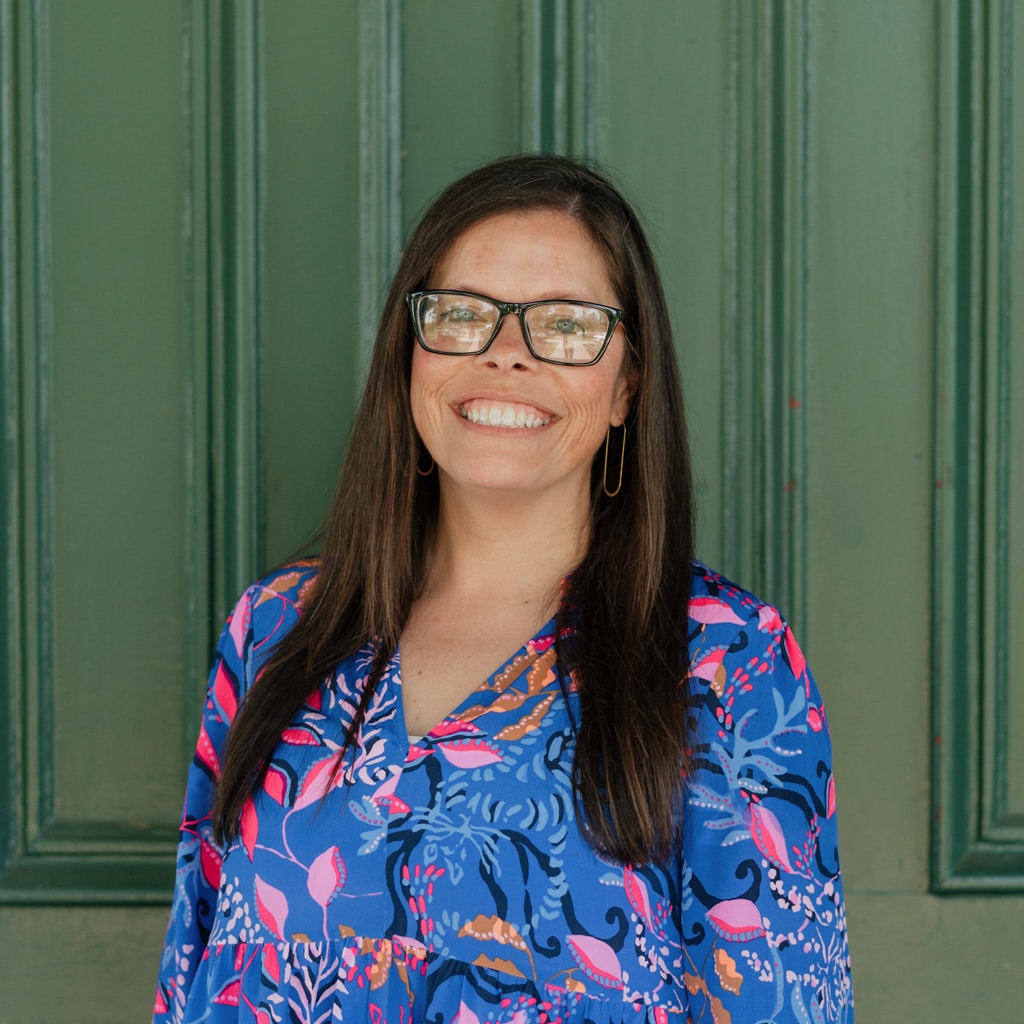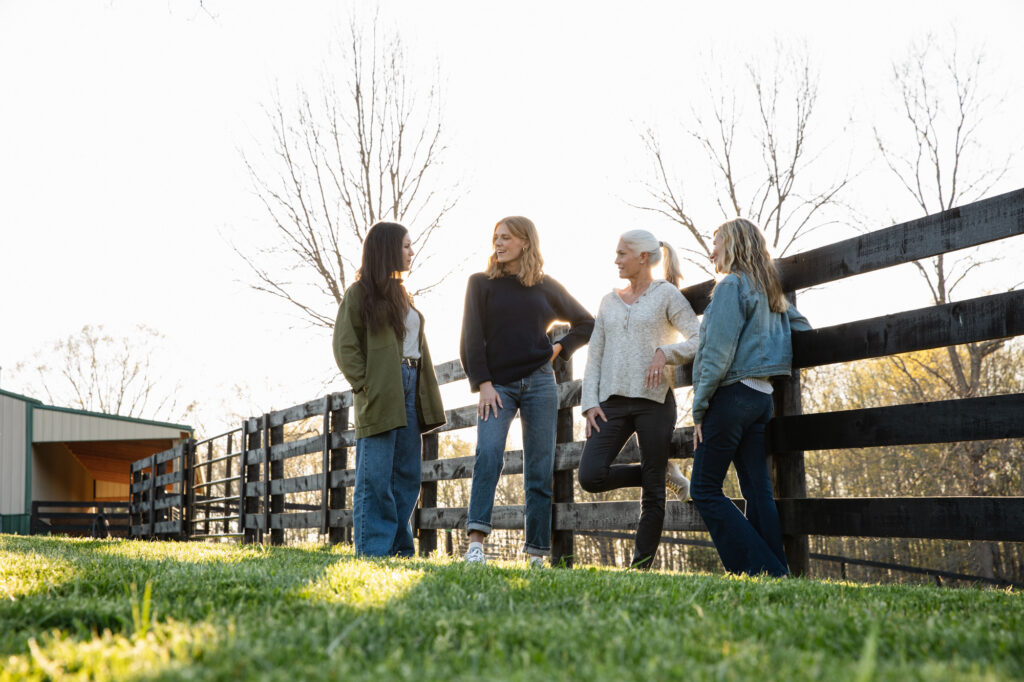The Cost of Consumption
Why the Content We Consume Is Keeping Us Stuck, Numb, and Unable to Cope with Life
From the Milestones Journal | Written by Christopher O’Reilly, MA, LPC
Do you feel overwhelmed with the sheer amount of information coming at you on a daily basis? Are you all too familiar with the sinking feeling you get after scrolling your newsfeed or the heaviness you feel when you lose your evening to binging a show you only slightly paid attention to? The statistics around our media consumption and exposure only reiterate our experience.
In the last fifty years, the number of ads we see daily has increased almost 2,000%. (Forbes)
American consumers spend around eight hours of their day with digital media. (Statistica, 2023)
In the US, Americans watched more than 19 million years’ worth of streaming content in 2022. (Nielsen, 2023)
Our overconsumption is coming at a high cost, and the price tag is often our resilience.
Why We Consume
For many of us, consuming media has become a habitual activity in which we partake with very little thought. Whether we turn to the media as a means of entertainment or escape, the algorithms on the platforms we scroll and stream are designed to keep us there— disconnected and numb. Offering a constant barrage of dopamine hits, the content we consume not only leaves us wanting more, but the effects often leave us worse off than when we started. Even the most intentional person has the propensity to become out of balance with their media consumption. The good news: you’re not the only one who is continually sucked into a scrolling or streaming spiral. The bad news: it is having adverse effects on your health, wellness, and ability to cope with life.
The Cycle of Consuming
The slippery slope of our constant need for information and distraction can trap us in an unhealthy cycle. When we consume passively to distract or escape the uncomfortable feelings within ourselves and our bodies, we become more disconnected from the present moment and our ability to cope. In short, we lose our resilience and hinder our mental, physical, and relational health.
How a Lack of Resilience Affects Us
- Difficulty with day-to-day functioning
- Overwhelming feelings of depression and/or anxiety
- Relational difficulties, including social anxiety, low self-worth
- Unhealthy patterns with food, exercise, drugs, alcohol, etc.
- Tendency toward isolation
- Feeling unsafe, intrusive thoughts
- Hypervigilant to surroundings
- Reduced ability to manage stress
- Lack of sleep
When Consumption Turns to a Lack of Resilience
Have you ever felt like your ability to handle life continues to decline? Maybe you even feel like a failure because you just can’t overcome the setbacks that life is throwing your way. Or maybe you’ve given up and don’t even have the desire or motivation to engage with your life?
Resilience: the ability to cope, bounce back, and transcend certain circumstances
Resilience requires motivation. Motivation requires healthy levels of dopamine. When we compulsively engage in behaviors that release a lot of dopamine at once, we trigger a cascade of dopamine and eventually burn out our receptors, resulting in a lack of motivation.
According to Anna Lembke, MD, psychiatry professor and chief of the Addiction Medicine Dual Diagnosis Clinic at Stanford University, when we consume social media or do other activities that over-activate our dopamine, our brains aren’t able to fire back to baseline, but rather experience rippling negative effects.
She asserts: “Our brains don’t just then bring our dopamine firing back to baseline level. It actually pushes dopamine levels below baseline. We go into a dopamine deficit state. That’s the way the brain restores homeostasis: If there’s a huge deviation upward, then there’s going to be a deviation downward. That’s essentially the comedown . . . that moment of wanting to stay online and click on one more video or connect with one more person. When we’re in a dopamine deficit, it can feel similar to depression and anxiety.”
Becoming Aware
Before you decide to throw away your phone and swear off technology, let’s dig a little deeper. What we often find at Milestones is that consumption is the symptom, not the problem. Life is hard. And some of us have had more than our fair share of pain and struggle. It makes sense that we find ways to escape and numb.
When we experience adverse life circumstances or live through systemic or acute trauma, we often seek out external means to turn down our internal discomfort. The problem with this solution is that it eventually catches up to us.
When we put off dealing with life on life’s terms, the stress of life doesn’t cease. In fact, it often amps up, and the result is a decrease in our ability to deal with what we’re facing and an increase in our stress, anxiety, and depression. Our problems get bigger when we ignore them, and the only way to cope is to disconnect from our present moment.
The answers to our questions are in this present moment, and our trauma keeps our mind always in the past or future.
If you’re struggling with the inevitable impact of overconsumption, the question might not be what’s wrong with you, but what happened to you? And how can you return to the present moment?
Practicing Presence
Being in the present moment, reflecting on our own thoughts, and tuning into our body isn’t possible when we’re constantly consuming information. The way forward in our lives is in. Meaning, we hold the answers to what we’re facing within ourselves, we just need to connect.
How are you going to get to know yourself if you’re constantly consuming information from other people?
Practicing presence may seem like an arbitrary and nuanced idea, but a few small changes in how we go about our days can interrupt the patterns holding us back and keeping us distracted, disconnected, and numb. Presence is all about bringing the mind into the here and now.
The mind can be in the past and in the future, which has benefits and challenges. We can avoid dealing with this moment by daydreaming and reflecting on the past. Existing in the present moment can be uncomfortable, and it can require attention and training on our part.
5 Ways to Practice Presence
- Go for a walk and focus your attention on feeling the ground under your feet.
- Spend time with friends or family with a shared commitment to not use devices or engage in outside distractions.
- Sit in silence alone and just notice the rise and fall of your chest as you breathe.
- When you drive alone, do nothing other than drive in silence.
- While eating, bring your full attention to the sensation of taste.
Finding Balance in Your Consuming Behaviors
If you’re ready to make a shift in the way you consume, here are five steps to making small, incremental changes.
1. AWARENESS
Before you can make a change, you need to get an accurate assessment of your current consuming habits. Work to get a baseline. Without changing anything, document how you spend your time during the day. Notice the moments you pick up your phone, look through the “screen usage” report on your phone to assess habits.
2. CREATE REALISTIC BOUNDARIES FOR YOURSELF
Cutting out technology altogether is probably not realistic. We live in an interconnected world. However, we can create realistic boundaries for ourselves that set us up for success and temper our consumption. The telling sign of a larger problem is when we’re unable to function within the boundaries we set. If we find that we compulsively struggle to adhere to these limitations, it might be an indication that we need outside help.
3. INTERRUPT THE HABITS
Often times we turn to technology without conscious thought out of habit. To break a habit, we have to create a new cue. Here are a few swaps to help you interrupt the unconscious patterns of consumption:
- When you get into your car, instead of listening to a podcast during your commute, call someone to catch up.
- When you pick up your phone, instead of scrolling social media, open up an app like Headspace.
- When you wake up in the morning, instead of reading the news, grab a notebook and journal.
- When you crawl into bed, instead of watching a TV show, pick up a book.
- When you need a brain break at work, instead of picking up your phone, go for a ten-minute walk.
4. CHECK IN WITH YOURSELF
After you’ve implemented these small changes into your day, schedule some time to check in.
- Take notice of how it’s impacted you.
- Have you felt more connected to yourself and others?
- What’s working? What’s not working?
- Do you want to make tweaks?
- Are there things you want to continue or stop doing?
- Do you need additional support?
- Is the time away from distracting yourself bringing up hard or uncomfortable feelings?
5. SEEK OUT SUPPORT
When we choose to stop consuming and lean into simply being, we will come face to face with the things that we’ve been trying to avoid. Many consume to avoid feeling emotions and the stress of our lives. If the discomfort of being present is too overwhelming, this is a good indication that you could need professional support. Resilience is at a premium in our current cultural moment. Our systems formation or more opportunity to disconnect and medicate. The answer to balancing out our overconsumption is rest, connection, and presence.
It can take some time to recover from a pattern of avoiding life through consuming. Stress and problems build over time and make it even more difficult to have resilience.
It can be overwhelming to build strength and resilience, yet the alternative is often further stress and struggle.
As you walk out this process, be gentle with yourself. It’s okay to not be okay. As you begin to practice showing up for your life, being present with yourself, asking for what you need, and taking the steps to take better care, you will begin to build the muscles required to keep doing the work.
Christopher O’Reilly, MA, LPC, serves as the Vice President of Clinical Services for Milestones. Christopher has an extensive career running residential and outpatient programs specializing in trauma, addiction treatment, and detox. Throughout a nearly twenty-year career with Caron Treatment Centers, he honed his administrative and clinical skills, overseeing residential programs’ full range of operational and therapeutic functions.
If you could use additional support unburdening the weight of the world, we’d love to be a support. Onsite and Milestones provide resources, tools, and experiences designed to help you boost your resilience and restore peace.
